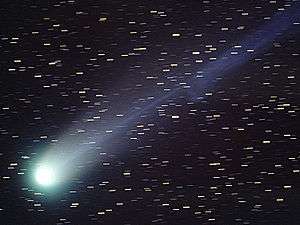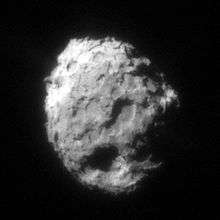83D/Russell
| Discovery | |
|---|---|
| Discovered by | Kenneth S. Russell at the UK Schmidt Telescope, Australia |
| Discovery date | 16 June 1979 |
| Orbital characteristics A | |
| Epoch | 2014-Dec-9 |
| Aphelion | AU |
| Perihelion | AU |
| Semi-major axis | AU |
| Orbital period | 6.13 yr |
| Inclination | ° |
83D/Russell (previously 83P/Russell) is a periodic lost comet in the Solar System with a previous orbital period of 6.13 years.[1]
The comet was discovered on a photographic plate on 16 June 1979 by Kenneth S. Russell at the UK Schmidt Telescope, Australia, who described it as faint and diffuse, with a very low brightness of magnitude 18. Calculations of its orbit suggested a perihelion date of 27 May 1979 and an orbital frequency of 6.13 years.
The predicted 1985 apparition was observed by J. Gibson using the 1.5-m reflector at Palomar Observatory California. He estimated the brightness of the nucleus at a very faint magnitude 19.5. Following that apparition the comet passed close to Jupiter, causing major changes to its orbit.
Its predited appearance in 1991 was not observed due to unfavourable conditions and it was missed again in 1998. In 2006, although conditions were very favourable, the comet was not relocated and hence it is now classified as lost.
See also
References
- ↑ "58P/Jackson-Neujmin". Retrieved 22 February 2015.
| Numbered comets | ||
|---|---|---|
| Previous 82P/Gehrels |
83D/Russell | Next 84P/Giclas |

